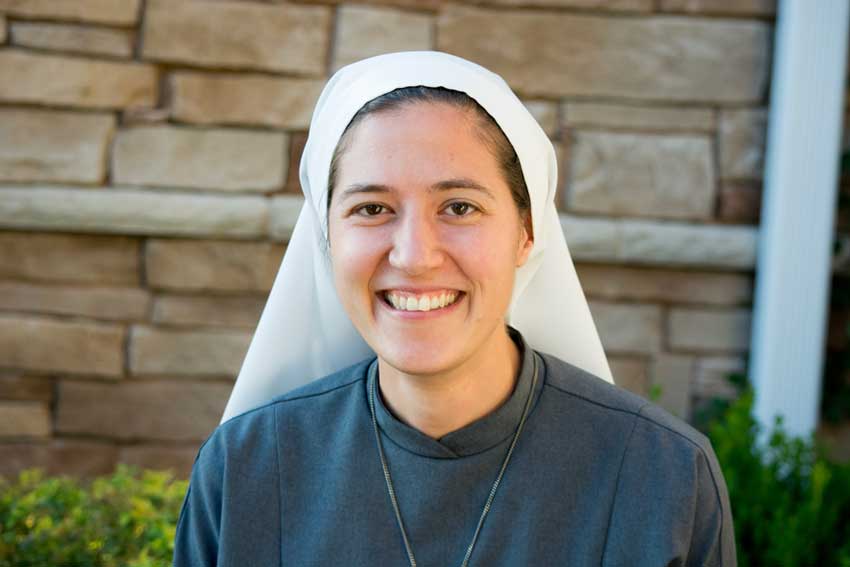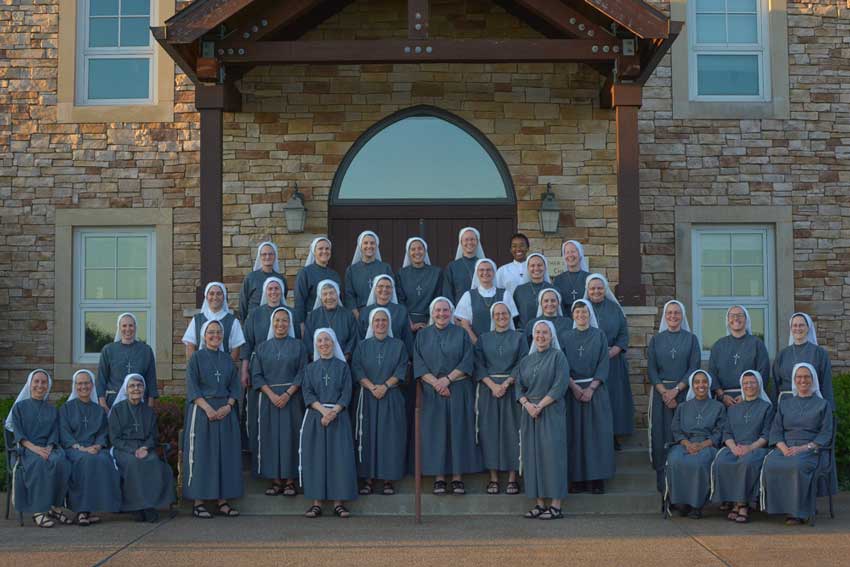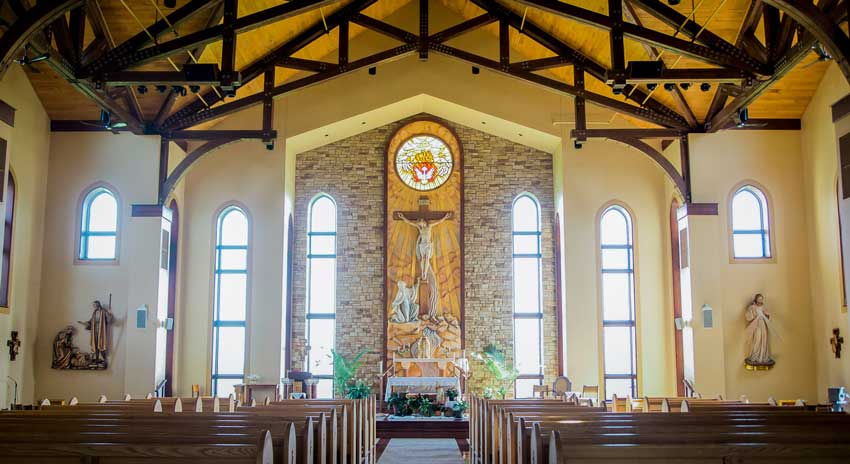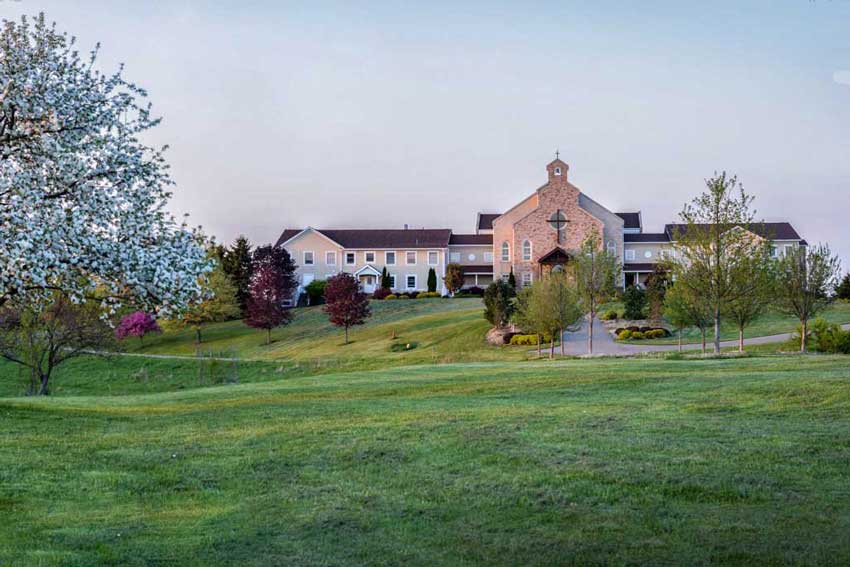
By Simcha Fisher
I recently had a chat with Sr Agnes Thérèse Davis
Sr Agnes is a 32-year-old sister who is a member of the Franciscan Sisters, TOR, a contemplative-active religious community that was founded in 1988. Her order values mendicancy and itinerancy, and I knew next to nothing about them or how one comes to join the order. It was a joyful, fascinating conversation, and I thought you’d like to hear it. My questions are in bold.
I’ve been a Catholic all my life so I’m a little embarrassed to ask: Are you a nun or a sister or what?
If you’re cloistered, you’re a nun. If you leave your house for reasons other than a doctor’s appointment, you’re a sister.
And have you made your final vows, or are you in the process?
When you come, you come very much in discernment about whether this is the life for you. The first year or two years is postulancy, which some from the Latin for “asking questions.” Then you become a novice, still without having taken vows, but practicing as though you were. The novitiate lasts two years. [You ask yourself,] if all I have is Jesus and community, will I survive? Then you make temporary vows, which are taken a year at a time. In our community, it’s typical to do this for four to six years. Then eventually you make your perpetual profession. I’m a lifer.
Can you tell me what a typical day looks like for you?
Our community was founded to renew the contemporary dimension of the early Franciscan life. Our foundress noticed that after Vatican II, we had all these amazing sisters running schools and hospitals, but when you compare that to people in Francis’ time, he would spend a third of his year in solitude, praying, and we wanted to recapture that life, which leads to service of neighbour. We wanted to emphasise the life of prayer as the foundation and the first work we offer the church.
That being said, we pray a lot.

There is holy hour every morning, after which we have morning prayer together and Mass, then more time for spiritual reading or more prayer, and then we go to work. It could be cooking, cleaning, or shopping. I coordinate our periodic ministries, and I also work in our mission advancement office. I work with the newsletter and mailings and so on, and I teach our postulants. I teach the catechism class to them. Right now, we have two.
There’s a break at noon for prayer, then lunch, and then maybe doing thank-you’s in the afternoon. Right now, every spare moment is spent getting ready for our chapter. And spiritual direction is a side hustle I’m involved in right now.
We rise at 5am, but we get up half an hour later on Saturdays and an hour later on Sundays, mercy being one of our charisms. We go to bed at 9:30; that’s when we’re supposed to have lights out.
When did you first hear the call to become a sister?
For me, thinking about religious life only began when I started praying more intentionally as an adult. Growing up, we were Missouri Synod Lutherans. When I became Catholic, I started living a sacramental life, and in a lot of ways lost my personal prayer life. In high school, all my religious energy was diverted toward proving to my protestant friends that it was okay I was Catholic.
Did your whole family convert?
We trickled in. My mom entered some years before; my brother entered the same year as I did, but a few months before. Then several years later, my dad. We’re still waiting on my sister. For me, it was mostly an intellectual conversion. I already loved God. After my mom became Catholic, she knew that I was a voracious reader and if she left things around, I would read them. She left things around that spoke about the history of Christianity.
Looking at the teaching on the Eucharist, I don’t see how you can get anything but the true presence from John 6. I was convinced in my mind, but I was really nervous. I was very close to my grandmother, who was very desolate when my mom entered the Church.
I was confirmed in the Lutheran church when I was 13. I knew it was provisional.
I knew I had to pray, not just sit in the chapel and read holy books. I had to be silent, and I would only get myself go in with scriptures and a journal. I can’t just read the Bible; even that can be a distraction. Just forcing myself to be in silence. I remembered God is a person who loved me. Not a checklist I need to complete or a rulebook in the sky I needed to appease. Remembering God was a person who loved me and had a vested interest in my life. I realised I should be asking him what to do with my life. I was in college by this point, and I thought, “I can’t just do whatever falls in my lap. I need to ask God what He wants.”
I noticed a growing desire to give Him my whole life, to be free to live for Him in everything.

Were you scared?
In everything I do, I’m never scared until I’m doing something. I’m more of a “head” person, and I’m kind of intense. It was never a question of what my emotional reaction was.
I remember going to prayer my junior year of college, and I met a religious sister at this point. She recommended a book by Thomas Dubay, And You Are Christ’s: The Charism of Virginity and the Celibate Life. I was starting to date this guy, and I remember going from the chapel to a date, and thinking Jesus was so much more real than Tim was. Tim was great, but he was never going to be able to compete with Jesus.
When did you really make the leap and start taking steps to become a sister?
It was when I first visited communities. Before then, it was just fantasy. I visited the National Dominicans, and their life was beautiful, but I had no peace when I was there. It was very unsettling. Then I came to our community, just because it was close to where I went to college. I knew they were a different flavour. Coming here and being with the sisters and feeling the way of life and living that rhythm, I felt like this was a place I could put down roots and be who God was calling me to be. I didn’t have a clear idea about what I was going to do, but this was a place that had the right climate for me to grow.
Did you have someone guiding you so you knew what steps to take next?
That would have been helpful! I met this religious sister my junior year of college. She was a help because she was joyfully living her vocation. I didn’t have a spiritual director until I was already in application and they told me I had to. It was mostly prayer and learning how to read my own reactions, read life, read my own heart in the light of God and who He is, and then it was super helpful when I started having a spiritual director to validate that, so it wasn’t such a solo act.
Was anyone discouraging when you started exploring a vocation?
A lot of people felt like I was wasting my life. “You’ve got gifts; the world needs them; why would you take yourself out of the human equation? You have so much to offer. Why hide it in a convent?”
And the other concern was: “There’s no way you’re really gonna be happy.” I think most people have known someone who’s an example of religious life that hasn’t gone well, or people who have been hurt.
It’s nerve wracking that there’s no rule book about what to do especially for religious life. When you’re dating, you can compare experiences [with other people who are dating], but there’s not enough people around discerning religious life to be able to do that. I know sisters, but I had never known them not as sisters, so it’s different. It was scary. This could ruin my life or deform my personality.
What are the greatest challenges of being a sister?
The same as the hardest parts of being in a family: Being with other people, learning how to love the family God gives you, to make space for the others while being yourself.

What does that look like?
For example, being a natural leader in the context of a religious community with a vow of obedience. You have to learn how to respect the systems that are in place, while being ready to give voice to your own ideas or questions or inspirations, and then be ready to lay those down. I was in a house with twelve women, and you can’t just say whatever’s on your mind.
What is the most rewarding?
Belonging to God. Being able to be so free to do whatever He asks. To be free to serve people directly, whether teaching postulants or doing a parish mission, or meeting with people in spiritual direction. How wonderful it is to be able to fill the little gaps that society leaves.
Also just belonging to God. Being able to be His, and have that be the fundamental question I ask myself, all through the say: What’s He asking? What’s He asking? That’s for everybody; it’s not just a nun thing. But the form of life in religious life makes it clearer and easier.
All the vows free you. I don’t have stuff. I don’t have to take that into consideration. I don’t have my own family that I have a primary responsibility toward. I don’t have a career I need to develop.
What advice do you have for those contemplating a religious vocation today?
To grow in relationship with God. Making time for prayers every day. And if you’re not of an age to be actively discerning religious life, don’t live as though you were. When we have some kind of future goal that looks really wonderful, it can keep us from living the life we have right now. If you’re in high school, be in high school. Go to dances, watch movies with your friends. It would be weird for a high school students to get up at 5am and do a holy hour. You thwart your human development taking on burdens you’re not ready for.
Is there anything else you would like people to know about life as a third order Franciscan?
Sisters are human. I think sometimes people think we’re a subspecies. People expect sisters to be more than human, or less, depending. Last year, I ran the Cleveland marathon with another sister. The most lasting takeaway was the joy people had when we were on the road with them, running and sweating with them, not just cheering them on. That’s what I want people to know: We’re on the road with them.
Related articles:
ABC journalist chases dream of entering a convent
Benedict’s sons come to Tasmania
The Tyburn Nuns of Riverstone: A beautiful life given to God
